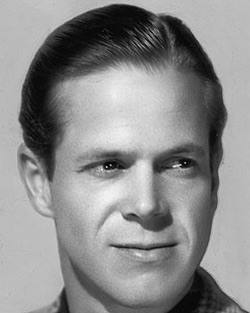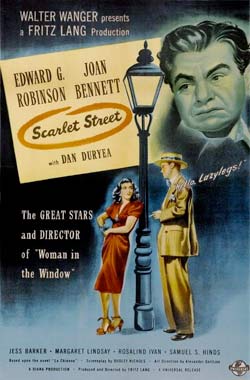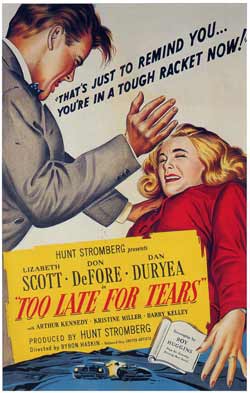 After watching a good Dan Duryea performance, I’m always reminded of Dashiell Hammett’s description of Sam Spade in The Maltese Falcon: “He looked rather pleasantly like a blond Satan.” Duryea’s charisma was an amusing superficiality masking an inner demon. This guy would slap around his own mother if it’d make him a buck. Like Kirk Douglas, he excelled at playing sons of bitches. If he never managed to become a leading man the way Douglas did, he still left an indelible impression on film noir (and, to a lesser extent, on westerns). If Duryea is in a movie, chances are he’s the most interesting person on screen.
After watching a good Dan Duryea performance, I’m always reminded of Dashiell Hammett’s description of Sam Spade in The Maltese Falcon: “He looked rather pleasantly like a blond Satan.” Duryea’s charisma was an amusing superficiality masking an inner demon. This guy would slap around his own mother if it’d make him a buck. Like Kirk Douglas, he excelled at playing sons of bitches. If he never managed to become a leading man the way Douglas did, he still left an indelible impression on film noir (and, to a lesser extent, on westerns). If Duryea is in a movie, chances are he’s the most interesting person on screen.
The Duryea persona was the charming sleazeball (his most famous role, tellingly, was as a pimp). He’s forever on the make—lying his face off, terrorizing women, talking fast, hatching schemes. He did this kind of thing better than anyone else, and the effect of it is only enhanced the more you’ve seen it before. A good movie like 1949’s Manhandled (in which he stalks Dorothy Lamour) would be a fine introduction to the actor, but it will play even better if you’ve already seen the 1945 masterpiece Scarlet Street (in which he plays Joan Bennett’s backhanding pimp) or the brilliant 1949 Too Late for Tears (in which he blackmails Liz Scott). The studio star system in the 1940s and ’50s ensured that once a popular character actor like Duryea established a persona, you could find him in movie after movie. Duryea has a deep bench of great work.
It is a particular challenge to explain to the uninitiated just how Duryea’s greasy charm works. Historian Eddie Muller has reported that in the 1940s the more Duryea slapped around women onscreen (bizarrely, it kind of became his trademark), the more fan mail he received. There’s nothing charming about misogyny, so why was Duryea a sex symbol? Part of it, I think, is that Duryea’s nastiness had a giddy shallowness to it. When Kirk Douglas is a son of a bitch onscreen, you believe it—you feel the disturbing pull of real anger there. Duryea is different. He never drops the charm for very long because charm is the chief weapon in his arsenal. He’s a coldblooded son of a bitch, but he’s always on the make. Like a pleasant blond Satan. Perhaps another reason for his popularity is that, like Satan, he always wound up going to hell in the end.
In real life, by all accounts, Duryea was an all-around nice guy and a devoted family man. (Check out this website devoted to him.) Below is a brief introduction to the work of noir’s nicest bad guy.
Essential Dan Duryea
(Note: this list just scratches the surface. Duryea made a lot of movies and most of them are worth seeing, if only to see him.)
 1. Scarlet Street (1945)—In director Fritz Lang’s dark love triangle, Duryea plays a pimp who convinces his prostitute girlfriend played by Joan Bennett to string along a lonely painter played by Edward G. Robinson. One of the greatest of all noirs, with Duryea cementing his onscreen persona as a rakish weasel. (See also 1944’s The Woman In The Window, with the same director and cast, which was kind of a rough draft of this film.)
1. Scarlet Street (1945)—In director Fritz Lang’s dark love triangle, Duryea plays a pimp who convinces his prostitute girlfriend played by Joan Bennett to string along a lonely painter played by Edward G. Robinson. One of the greatest of all noirs, with Duryea cementing his onscreen persona as a rakish weasel. (See also 1944’s The Woman In The Window, with the same director and cast, which was kind of a rough draft of this film.)
2. Black Angel (1946)—Based on the Cornell Woolrich novel, Duryea plays an alcoholic pianist whose ex-wife is brutally murdered. A suspect played by John Phillips is arrested and sentenced to die for the crime, but Phillips’s faithful wife (June Vincent) tries to prove he’s innocent, enlisting Duryea to help her in her investigation. Duryea gets to play a nice guy, albeit one who is a full-fledged antihero.
3. Manhandled (1949)—Back in bastard mode, Duryea plays a sleazy con man making life miserable for his neighbor Dorothy Lamour. Although he’s the heavy, he’s the only one who knows what’s going on through most of the movie, so he becomes the de facto main character. Our identification with him gives the film juice and makes it more noir to boot.
4. Criss Cross (1949)—Directed by the great Robert Siodmak, this is the second noir masterpiece with Duryea in a supporting role. Burt Lancaster is a driver for an armored truck company. He’s in love with his ex-wife, Yvonne De Carlo. She’s in love, or something, with gangster Duryea. This is almost a textbook example of a film noir: a flawed antihero, a beautiful femme fatale, an interesting villain, a lively supporting cast, and gorgeous black and white cinematography. Of course, it takes more than a list of elements to make a great film, and Criss Cross also happens to be an excellent example of that rare magic that touches only a few movies. Duryea, playing a more tragic, tight-lipped version of his usual villain, is superb.
 5. Too Late For Tears (1949)—Duryea’s third noir masterpiece is one of the great unknown noirs, a story that inverts everything we think we know about the genre. He plays a blackmailer trying to recover some ransom money mistakenly delivered to housewife Lizabeth Scott. He thinks he can walk in, slap her around, and get his money. She relieves him of that mistaken impression—the hard way. She teaches Duryea’s smiling misogynist an important lesson: no one slaps around Liz Scott and lives to smile about it.
5. Too Late For Tears (1949)—Duryea’s third noir masterpiece is one of the great unknown noirs, a story that inverts everything we think we know about the genre. He plays a blackmailer trying to recover some ransom money mistakenly delivered to housewife Lizabeth Scott. He thinks he can walk in, slap her around, and get his money. She relieves him of that mistaken impression—the hard way. She teaches Duryea’s smiling misogynist an important lesson: no one slaps around Liz Scott and lives to smile about it.
6. The Underworld Story (1950)/Terror Street (1953)/World For Ransom (1954)/The Burglar (1957)—Because of his popularity as a supporting player, Duryea was occasionally given the opportunity to transition into a leading man. Somehow it never took. The four films listed above all have their virtues (the best of the bunch is probably Cy Endfield’s The Underworld Story), but none of them could make Duryea into a leading man. Looking back at his best performances, you can see that Duryea’s charm was always a surface level smarminess masking a deep-seated selfishness. That appeal was tough to translate into heroism, even of the tarnished antihero sort. His real talent lay in being a great character actor. No shame in that.
Jake Hinkson, The Night Editor, is the author of Hell on Church Street.
Read all posts by Jake Hinkson for Criminal Element.

PS. Dangerous Dan’s contributions to Westerns were also significant. See NIGHT PASSAGE and SILVER LODE. And don’t miss WINCHESTER 73–which is a particularly nice example of DD’s appeal. He rides into the movie about halfway through, and you can feel the whole picture perk up.
I’ve always liked his acting in noir. Too Late for Tears is a longtime favorite of mine – good to see it singled out. Love Criss Cross, too. Another nice piece.
In an outstanding cast, he was memorable in The Flight of the Phoenix.
Loved him in The Burgler even though he was much too old for the role. He and Martha Vickers had good chemistry.
And then there’s his ow favorite among his roles, “Chicago Calling”, in which his ability to really pull on the heartstrings is finally given a chance. It’s a “little” film, but he’s great in it.
ow = own